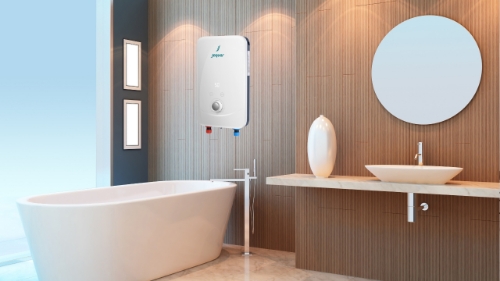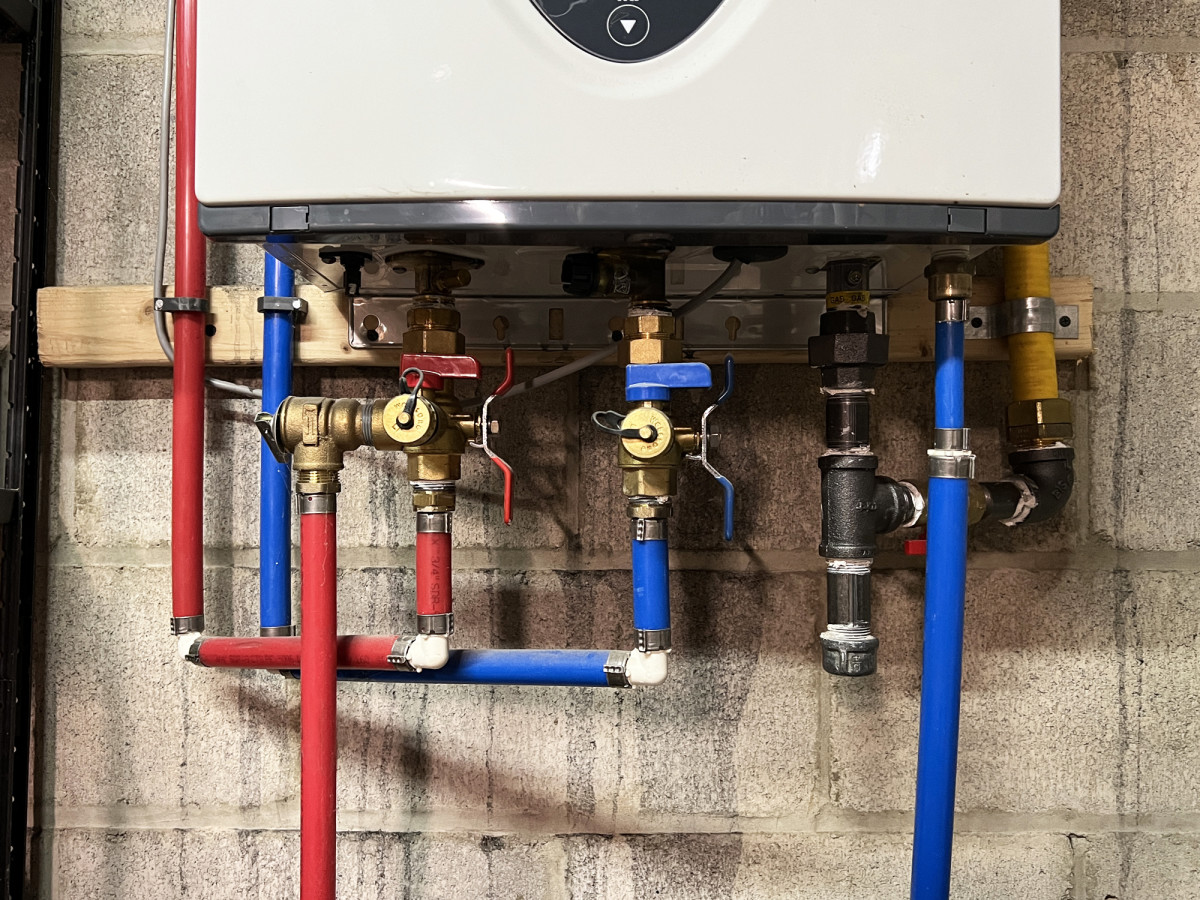Uncovering The Pros Of Smart Water Heaters
Uncovering The Pros Of Smart Water Heaters
Blog Article
Just about everyone may have their personal conception when it comes to Unveiling the Hot Trend: The Benefits of Tankless Water.

In a globe where comfort and effectiveness reign supreme, it's no surprise that house owners are continuously on the lookout for smarter means to handle their home's power usage and convenience. One innovation that has actually progressively obtained appeal is the tankless water heater. But just what makes these systems stand out from the traditional tank-based versions the majority of us matured with? Allow's dive in and discover the advantages of tankless hot water heater, aiding you decide if it's time to make the switch in your home.
Introduction
Picture this: you enter the shower after a lengthy day, expecting a calming cascade of warm water, just to be welcomed by icy droplets because the last person used it all up. Sound familiar? Typical hot water heater keep a fixed amount of hot water, indicating you're at the grace of that storage tank's supply. Tankless systems, on the other hand, heat water as needed. Say goodbye to running out mid-shower, no more fumbling with routines simply to make sure hot water is offered.
Understanding Tankless Water Heaters
What Are Tankless Hot Water Heater?
Tankless water heaters, in some cases referred to as on-demand or instantaneous water heaters, give hot water only as it's needed. Rather than keeping gallons of pre-heated water, these devices kick right into activity the moment you switch on the tap. Water goes through a warm exchanger, warming up in real-time, meaning you get a continuous flow of hot water without the need for a huge tank resting idly by.
How Do They Vary from Typical Solutions?
Standard heating systems hold a tank of hot water, utilizing energy to keep that storage tank at a consistent temperature. Tankless units remove the standing supply, reducing wasted power and the large footprint of a huge cylinder. Basically, you're updating from a "stockpile" frame of mind to a "made-to-order" approach.
Typical Types of Tankless Devices
Tankless hot water heater usually can be found in 2 ranges: gas and electric. Gas versions often tend to deliver greater flow prices, ideal for larger houses, while electric designs often offer smaller homes and are typically much easier to set up. In addition, some systems are designed for point-of-use (serving one fixture) while others can handle the entire home's warm water demands.
Trick Benefits of Tankless Hot Water Heater
Energy Efficiency and Expense Cost Savings
Say goodbye to warming a giant storage tank's well worth of water and maintaining it toasty all day. Tankless heating systems decrease standby power losses, which can decrease energy expenses. While the initial cost might be greater, the long-term financial savings typically justify the investment.
3. Space-Saving Style
If your home is short on storage, eliminating the large container liberates beneficial area. Tankless units are compact and can commonly be placed on walls, concealed in corners, or installed in limited utility storage rooms without gobbling up the entire room.
4. Longer Life expectancy
A well-kept tankless water heater can outlast its tank-based relative. Standard tanks may last 10-15 years, while tankless models can maintain chugging along for two decades or even more, making them a solid financial investment with time.
1. Unlimited Warm Water Supply
Ever had to arrange showers so everyone gets their reasonable share of hot water? With tankless, that ends up being a distant memory. As long as the heating unit's circulation capacity isn't surpassed, you can take back-to-back showers without turning into a popsicle.
5. Improved Water Quality
Keeping water in a container can in some cases cause debris build-up or a slightly "off" preference. With tankless systems, fresh water is heated on the spot, decreasing the chances of sediment accumulation and potentially offering cleaner-tasting water.
Considerations Prior To Switching
Though the advantages are compelling, it's wise to take into consideration a couple of aspects before totally devoting.
Examining Your Home's Water Usage Patterns
If your household simultaneously makes use of several fixtures with high warm water demand, ensure the unit's flow price satisfies your needs. Understanding your usage patterns assists you select the right size and type of tankless heater.
Maintenance and Treatment Tips
Tankless systems are fairly low upkeep, however they aren't set-it-and-forget-it home appliances.
Normal Cleansing and Descaling
Hard water minerals can build up in the warmth exchanger, affecting effectiveness. Normal descaling (commonly recommended yearly) maintains the unit running at peak performance.
Annual Expert Assessments
A yearly checkup from a specialist makes certain minor issues are caught early. They'll assess the unit's efficiency, seek leaks, and help keep optimum effectiveness.
Preliminary Investment Expenses
Tankless heaters generally come with a greater in advance cost. In between the device itself and prospective installation adjustments, the initial expense might give you sticker label shock. But keep in mind to watch it as a long-term investment.
Installment Demands
Depending upon your home's facilities, you could need added electric capability or gas line upgrades. Ensure you comprehend the setup requirements and talk to an expert to avoid shocks.
Making Certain Proper Air Flow
For gas versions, proper ventilation is important to safely eliminate exhaust gases. Make sure venting systems are clean and correctly installed to avoid any type of prospective safety and security threats.
Contrasting Different Brands and Versions
Not all tankless hot water heater are produced equivalent.
Researching Dependable Producers
Look for respectable brand names with a background of creating quality devices. A trustworthy maker usually provides better consumer support and longer warranties.
Installation: Do It Yourself or Professional?
While some house owners relish dealing with jobs themselves, tankless setup might not be the most effective time to break out the tool kit.
Advantages and disadvantages of DIY Installment
A DIY install might conserve cash, but it includes dangers. Wrong installment can lead to inadequacy or safety issues. If you're handy and have experience, it may be possible-- but proceed with caution.
Reading Reviews and User Feedback
User reviews and responses from next-door neighbors or buddies that have actually gone tankless can supply beneficial understandings. Sometimes, real-life experiences can be more telling than marketing brochures.
When to Call a Specialist Plumbing Professional
For the majority of, calling a pro guarantees everything's done correctly. A specialist plumber recognizes neighborhood codes, sizing demands, and airing vent specifications, decreasing the threat of mishaps.
Maximizing Effectiveness
You have actually bought a tankless unit-- now optimize its performance.
Optimum Temperature Settings
The majority of people establish their devices in between 120-140 F. Readjusting the temperature level can improve convenience and savings. Experiment to find a sweet area that does not waste energy.
Pairing with Low-Flow Fixtures
Intend to stretch your unit's capabilities? Take into consideration setting up low-flow showerheads and faucets. They minimize water usage, allowing your tankless system to supply a consistent stream of hot water without stressing.
Ecological Impact
Tankless hot water heater straighten with greener living goals.
Reduced Carbon Impact
By utilizing less energy and only home heating water as needed, tankless systems can decrease your home's carbon footprint, decreasing your environmental effect.
Preserving Natural Resources
Less power intake and less lost warm water translate into less natural deposits being used, an ecological win-win.
Who Benefits A Lot Of from Tankless Heating systems?
The beauty of tankless heating units is that they can fit a selection of families.
Huge Households vs. Single Owners
Large family members may love the countless warm water supply, while single owners value the power financial savings from not heating a whole tank for simply a single person's early morning shower.
Property Owners with Restricted Area
If your home is short on square footage, losing the large storage tank frees up room for various other essentials-- or possibly simply extra breathing space.
Eco-Conscious Customers
Going tankless aligns with eco-friendly values, guaranteeing you're not squandering energy or resources.
Future Fads in Tankless Hot Water Heater
The globe of home appliances is ever-evolving, and tankless hot water heater are no exemption.
Improvements in Technology
R&D is constantly enhancing heat exchangers, making systems much more reliable and resilient. Future designs could be even quieter, extra compact, and much better matched for differing environments.
Smart Home Assimilation
Picture readjusting your hot water heater's temperature level through an app or getting maintenance signals on your phone. As clever home technology breakthroughs, we'll see even more connectivity and comfort.
Final thought
Selecting a tankless water heater is greater than just upgrading your home's warm water system; it's buying long-lasting comfort, power efficiency, and a greener way of living. By considering your family's water usage, bearing in mind setup needs, and dedicating to routine upkeep, you can take pleasure in a stable stream of warm water without the baggage of a large tank. As modern technology develops, you can look forward to also smarter, much more efficient tankless remedies that not just make your life simpler however also profit the world.
Why You Should Consider a Tankless Water Heater for Your Home
Energy Efficiency and Cost Savings
Tankless water heaters, also known as on-demand water heaters, heat water only when needed. This means they don't waste energy keeping a tank of water hot constantly. This efficiency translates into substantial cost savings on your monthly energy bills.
Endless Hot Water Supply
One of the significant advantages of tankless water heaters is their ability to provide a continuous supply of hot water. Traditional tank water heaters have a limited capacity and can run out of hot water, especially during peak usage times. In contrast, tankless water heaters can provide an endless stream of hot water, making them ideal for larger families or homes with high water usage.
Space-Saving Design
Tankless water heaters are compact and take up significantly less space compared to traditional tank heaters. They can be installed on walls, under cabinets, or even outside, freeing up valuable space in your home. This makes tankless water heaters a great option for smaller homes or properties with limited space for a traditional water heater.
Longer Lifespan and Lower Maintenance
Tankless water heaters typically have a longer lifespan compared to traditional tank heaters. They can last up to 20 years or more with proper maintenance. Additionally, tankless systems are designed with replaceable parts, which can extend their lifespan further and reduce long-term maintenance costs.
Environmentally Friendly
Reducing energy consumption not only saves you money but also benefits the environment. Tankless water heaters contribute to a smaller carbon footprint by using less energy to heat water. Their energy efficiency and ability to minimize standby heat loss make them an eco-friendly choice for environmentally conscious homeowners.
Customized Temperature Control
Tankless water heaters offer precise temperature control, allowing you to set the desired temperature to meet your specific needs. This level of customization ensures you always have water at the perfect temperature for your comfort and usage requirements.
https://beantownservices.com/blog/consider-tankless-water-heater-for-your-home

As a reader about Unveiling the Hot Trend: The Benefits of Tankless Water, I thought sharing that piece of content was important. Are you aware of somebody who is enthusiastic about the subject? Do not hesitate to promote it. I love your readership.
Schedule Your Job Now Report this page